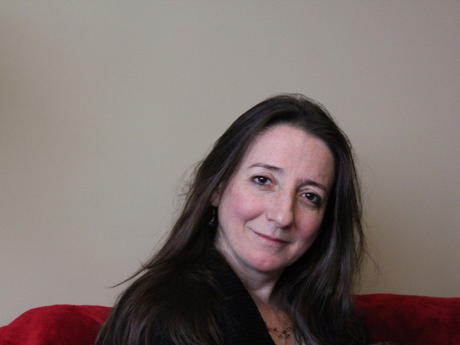In Their Own Words
Saskia Hamilton's “On the Ground”

On the Ground
i.m. Joshua Shackleton
When the collie saw the child
break from the crowd,
he gave chase, and since they both
were border-crossers,
they left this world.
We were then made of –
affronted by – silence.
The train passed Poste 5, Paris,
late arrival, no luck, no
enlarging commentary
magnified in any glass.
'The ineffable
is everywhere in language'
the speaker had said
in the huge hall where
I sat amongst coughers,
students, in the late
February of that year,
at the end of a sinuous
inquiry on sense and sound –
'and very close to the ground,' he'd said.
Like mist risen
above the feet of animals
in a far field north of here.
Originally published in Poetry July/August 2012. Reprinted with the permission of the author.
On "On the Ground"
Dutch is not my mother tongue, but it is my mother's tongue. Though my brother and I were not raised bilingually, we've heard it all our lives. The sound of the language first and always precedes its meanings to me (Frost's "the sound of sense"). In the past two years, I have been studying a small group of Dutch poets and writers, mostly reading them aloud. It's not a proper study, and the list is eclectic, guided by other people's bookshelves. It was prompted by Elliot Aguilar, who has been translating the work of Hendrik Marsman, and I have been turning also to the poetry of Gerrit Achterberg, Ida Gerhardt, M. Vasalis, Hans Favery, and Rutger Kopland, as well as the prose of Multatuli ("I have carried much"), Nescio ("I don't know"), and Rudy Krousbroek's essays on photographs of animals.
Kopland, who died last summer, has a poem entitled "Gesprek," or "Conversation," in which he falls silent. His companion asks him why. He writes:
ik zou willen zeggen dat ik zwijg
over mijzelf want ik weet niet
wie dat is
("I wanted to say that I am silent/about myself since I don't know/who that is"). "Ik zwijg": in Dutch, zwijgen (to be silent, to hold the tongue), is an active verb. The verb is resonant within Dutch history, since William of Orange, a figure of resistance, is known as Willem de Zwijger (William the Silent). No equivalent active verb in English has survived in common usage. "Swie," which the OED tells us derives from "the Old English swígan and swῑgian…; ultimately related to Greek σῑγή silence, σῑγᾶν to be silent," is obsolete, only recorded between 900 and 1225. The primary meanings of the verbs "to silence" and its softer cognates "to quiet" and "to hush" don't capture it either. To quiet or quieten is to soothe or calm. To silence is to compel someone (or some animal) to silence, to suppress noise or speech, to overcome in argument; its other uses are rare. The width of common meanings of zwijgen is broader – to pass over in silence, to be still or quiet, to keep one's counsel – and encompasses many kinds of silence, silences that are internal, that are closed or open, that conceal or that simply keep the peace. "Reserve" or "reticence" gives a better idea of some of it sense – circumspection or discretion, for instance, or disinclination to speak, or avoidance of saying too much. Kopland's interlocutor recognizes something in the quality of the poet's silence that she wants him to interpret for her. He is not entirely mute, he "wanted to say" that he can't quite say. Dickinson writes, "It is the Ultimate of Talk—/the Impotence to Tell." But then "impotence" is not for every given instance, since zwijgen can also be an act of courage or defiance, the return of silence, or turning to and facing another in silence.
How the poets who have used zwijgen relate different forms of silence to questions of address (the natural world doesn't speak back) has helped me to understand a group of poems I'd written previously, over the past five or six years – poems that are concerned with silence and keeping silent.
"On the Ground" is one such poem, about a moment of turning, which is also the year's turning or the season's turning. In the winter of 2007, I was in England and attended a lecture about Samuel Johnson's arguments with other lexicographers about onomatopoeia, including a dementedly funny listing of all the words in English having to do with the nose that begin with the letter s. (Nearly thirty.) But then the professor said this remarkable thing: "the ineffable is everywhere in language, and very close to the ground." The image that came immediately to my mind – to my eyes – was of mist. Talking about it afterwards with a friend, she wondered if the end of Paradise Lost was in his thought:
and from the other Hill
To thir fixt Station, all in bright array
The Cherubim descended; on the ground
Gliding meteorous, as Ev'ning Mist
Ris'n from a River o're the marish glides,
And gathers ground fast at the Labourers heel
Homeward returning.
"Fast," which is both quick and fixed. And "Homeward returning" – as Adam and Eve are leaving paradise. There is too much to say about this in brief, or about uses of words that have become rare or obscured but remain in the memory of usage. This poem was written for a young member of my family, whose presence and absence is felt everywhere still. It is also a love poem; so it is for those who are missed.


